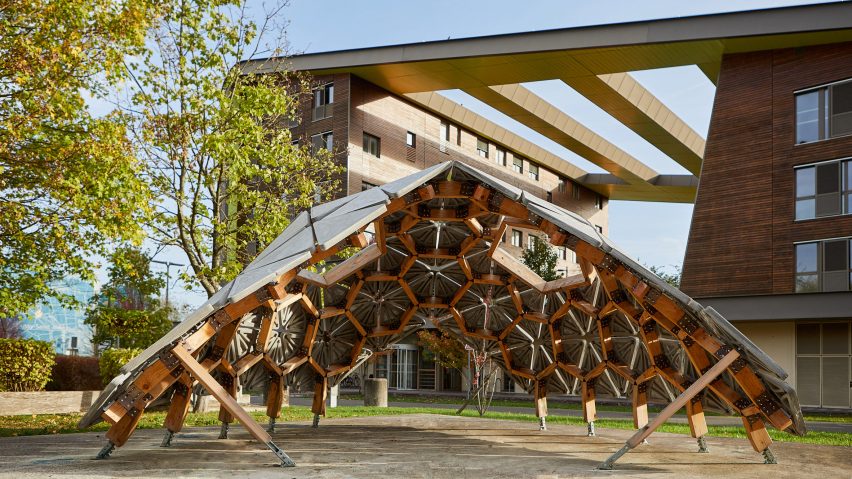Promotion: French engineering school École des Ponts ParisTech offers a master's degree that gives students and practitioners a comprehensive knowledge of parametric architecture, robotics and digital manufacturing.
Launched in 2016, the Digital Building Design master's degree is 16 months long and is taught in English. The course is designed to give students a solid knowledge of parametric generative design, computer-aided manufacturing and 3D printing.
École des Ponts ParisTech says that its executive master's degree addresses a number of contemporary challenges in architecture and construction, including energy performance, sustainability and the demand for sustainable methods of productivity.
It is aimed at builders and designers who wish to gain the academic knowledge and digital tools needed to meet the new challenges posed by the "ecological transition and the industrialisation of construction".
"Ways of designing buildings and structures are changing, as are construction methods and the associated professions," said the school. "Digital tools offer new opportunities for players in the sector, who need to learn how to seize them collectively."
The course includes a four-month full-time semester where students acquire the fundamental concepts of parametric design, followed by a five-month semester where they can study a particular subject in greater depth. Students can choose to specialise in either digital design or robotic manufacturing.
"Computational design and more generally the use of artificial intelligence have become essential aspects in the designer's daily life, particularly in architecture and urbanism," said course graduate Lea Khairallah. "Bringing together different fields such as physics, mathematics, design and art, they provide designers with methods and tools that allow them to go beyond traditional approaches and generate an innovative vision of the various issues encountered during their projects."
"The Digital Building Design executive master's degree offers – through a transversal and multidisciplinary approach – a 360 vision allowing an understanding of the computational design's world," Khairallah continued.
"Presenting various subjects and innovative projects equipped me with a series of modern tools and methods. Above all, it helped me develop a new approach to problem-solving that I apply in my daily professional life."
During the course, students gain access to the school's digital fabrication machines, including 3D printers in the school's dedicated maker space.
École des Ponts ParisTech says that at the end of the training, graduates will have a complete understanding of the tools required to build objects with complex geometries in addition to robotic manufacturing and digital design. Graduates will also be equipped to develop an innovative workflow "using a computational and collaborative approach towards architecture and engineering".
On graduating, students can continue developing careers as project managers, structural engineers, computational designers, robot and drone designers or interactive designers.
"The programme prepares graduates for a number of high-level positions in architectural design with a strong emphasis on digital innovation, computational robotics and manufacturing," said the course's director, Romain Duballet.
"Graduates of the program may qualify for positions in architectural offices, urban design studios, construction firms specialized in complex geometry, robotics and digital fabrication, graphic design, art studios, consulting innovation firms, 3D printing platforms and software development companies."
Applications for the Digital Building Design master's course open each year in January. The school recommends applying online for the next session as early as January 2024 for a September 2024 start date.
Founded in 1747, École des Ponts ParisTech is a higher education establishment that offers various master's and PhD programmes in numerous subjects, including environmental sciences, nuclear engineering, mathematics, urban planning, economics, transportation, sociology, mechanical engineering and civil engineering.
Images courtesy of Charlène Yves, École des Ponts ParisTech.
To learn more about the course visit the school's website.
Partnership content
This article was written by Dezeen for École des Ponts ParisTech as part of a partnership. Find out more about Dezeen partnership content here.

